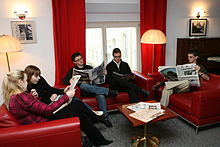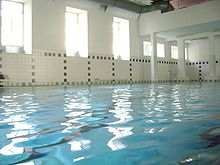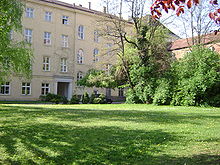- Diplomatic Academy of Vienna
-
Diplomatic Academy of Vienna Diplomatische Akademie Wien 
Established 1754 Type Postgraduate Director Hans Winkler Students 150 Postgraduates 150 Location Vienna, Austria Campus Urban Former names Oriental and Imperial Consular Academy Affiliations APSIA Affiliate Website http://www.da-vienna.ac.at The Diplomatic Academy of Vienna (German: Diplomatische Akademie Wien, colloquially known as the "DA"), with roots tracing back to 1754, is a graduate school of International Relations located in Vienna, Austria. The Academy offers Masters degrees in advanced international studies as well as a Diploma programme, both of which train students in international history, diplomacy, law, economics, politics, and include a strong emphasis on language proficiency. The institution is relatively small, averaging around 150 students spread among its three academic programmes.
Contents
History
The Diplomatic Academy of Vienna (German: Diplomatische Akademie Wien; French: Académie diplomatique de Vienne) is the world's oldest school of international relations, predating the Edmund A. Walsh School of Foreign Service at Georgetown University. The Diplomatic Academy is the successor to the Oriental Academy, which was founded in 1754 during the reign of Empress Maria Theresa. The Oriental Academy was established to prepare diplomats for service in eastern diplomatic missions, and as a result considerable emphasis was placed on language study – including Persian, Turkish and Arabic – and on economics.
At the end of the nineteenth century, the Oriental Academy became the Imperial Consular Academy, which outlived the Austro-Hungarian Empire by two years. The institution carried on under new ownership in the 1920s and 1930s and survived until shortly after the Anschluss with Nazi Germany in 1938. The Diplomatic Academy was reopened in 1964 by Foreign Minister Bruno Kreisky as a state-run institution, offering a two-year Diploma programme tailored particularly towards training young Austrians for the diplomatic service (although international students always took part as well). It was in fact attached to the Austrian Foreign Ministry and considered Abteilung V des BMAA. The number of participants for each class (Lehrgang) was limited to 20 students. The first director of the Diplomatic Academy (post-1964) was Ernst Florian Winter.
In 1996 the institution was partially privatized and relaunched in a modernization process that is still underway. The institution began offering a Masters degree in 1996, concomitant to the Diploma programme; in 1999 this programme was elaborated into a 2-year degree similar to those offered by Anglo-Saxon institutions such as Johns Hopkins' Paul H. Nitze School for Advanced International Studies (SAIS) and Georgetown's Edmund A. Walsh School of Foreign Service.
As of April 2009, the Academy is headed by Ambassador Hans Winkler, former State Secretary of the Republic of Austria.
Academics
While the Academy is divided into 3 major programmes of study (see below), all share the fundamental tenets. There are 4 "core" areas of tuition: Modern History, International and European Law, Political Science, and Economics. Additionally, the study of languages is very important.
Main Programmes of Study
The Diploma Course (German: Diplomlehrgang) is the oldest established programme, with entry by competitive examination. It was initially designed to help young Austrians enter the Austrian foreign service; indeed the diploma was a requirement for taking the Préalable exam if students had not previously studied the relevant fields. The Diploma programme includes courses in Economics, International Law, European Law, Political Science, Modern History and soft skills over the course of 1-year. Knowledge of English, German and French – at least at a functional level - is strongly preferred, as some courses are taught in these languages. The Diploma Course is equivalent to a British M.Sc and may serve as the first year of the 2-year MAIS degree.
The Master of Advanced International Studies (MAIS) is a postgraduate degree offered jointly with the University of Vienna and broadly equivalent to a British M.Phil. It is structured as a two-year programme, although students may enter directly into the 2nd year if they (1) completed the Diploma Course, (2) completed a Masters or equivalent at a recognized university, or (3) have extensive work experience in international relations. The first year of MAIS consists of multi-disciplinary courses in the fields of Economics, International Law, European Law, Political Science, and Modern History. The second year of MAIS consists of specialized seminars, workshops and individual study for the Masters thesis, which must be interdisciplinary in nature. The language of instruction is English.
Starting in 2007-2008, the Academy offers the Master of Science in Environmental Technology and International Affairs (ETIA) degree, jointly awarded with the Technical University of Vienna. The first year of this programme is similar in content to the first year of the MAIS; in the second year students take more courses at the Technical University and write a thesis involving environmental technology.[1]
Language Study
The study of foreign languages was one of the pillars of the original Oriental Academy founded by Maria Theresa, and it remains an integral part of the Academy's tuition today.
All students in first-year are required to study English and German (unless they can speak it at mother tongue level); participants in the Diploma programme must also study French. During the regular academic year the study of these languages is a core component of tuition, most mornings being devoted to language classes.
The Academy also offers a number of other language courses on an optional basis. For participants of the MAIS and ETIA, French is offered as an optional course. For students of all programmes, the Academy in 2007-2008 offered evening classes in Chinese, Russian, Spanish, and Arabic.
Structure of Academic Year and Teaching
First-Year of the MAIS Programme
The academic year runs from October through June and is divided into three trimesters. The fall trimester (Oct-Dec) tends to concentrate on introductory courses in all 4 areas. Students are required to take those courses, unless they majored in the area during their undergraduate studies. In the winter (Jan-March) and spring (April–June) trimesters, courses become more advanced and more frequent. There are two breaks during the year, for Christmas and Easter.
Course styles vary from strict lecture format to more informal seminars. Most evaluation is based on final examinations, although some courses require papers.
Second-Year of the MAIS Programme
The first semester of the second year runs from October until December. Students are required to take at least 4 "core courses", covering at least 3 academic disciplines, all of which lead to final examinations in December. During the winter and spring semesters students take intensive seminars, for which they are to write seminar papers, and work on their Master's Theses.
Course scheduling for the second year of study at the Diplomatic Academy is much lighter than for the first year - there are far fewer class hours per week, and language study is optional - allowing many students to obtain internships or work on the side.
Exchange Possibilities and Study Trips
All programmes feature study trips as integral elements. The first year programmes travel to Brussels and Luxembourg in order to visit the major EU institutions. The second year features study trips to the Ukraine as well as to the Balkans. Most costs for these trips are included in the regular tuition. Visits to some of the institutions located in Vienna, such as the UN, IAEA, OSCE, and OPEC, are also offered.
The study of the Russian and Chinese languages is supplemented by optional study trips to China and Russia, which take place in the summer months following the completion of the academic year. These trips are also subsidized by the Academy, though participants must bear some of the cost.
Exchange agreements exist with some comparable institutions. Cooperative degrees, through which students may study one year at each institution exist with the Bologna Center of the Paul H. Nitze School for Advanced International Studies (SAIS) and the Fletcher School of Law and Diplomacy. Other long-standing partner institutions include Sciences Po Paris and the Diplomatic Academy of the Ministry of Foreign Affairs of the Russian Federation.
Other activities
In addition to its primary function as a postgraduate professional school, the DA also runs a number of ancillary events, including:
- Summer language courses in German
- Special training courses for young diplomats from emerging democracies
- Host location for various conferences
- Host location for guest lectures by visiting academics
- Host location for addresses by visiting State dignitaries
Location and Premises
The Diplomatic Academy is situated in the fourth district of Vienna (Wieden), at Favoritenstrasse 15a. The building is approximately 10 minutes by foot from the Vienna State Opera and the historic first district, and conveniently located directly on the Subway line U1 (Taubstummengasse). The institution occupies part of the premises of the former Favorita palace built by Maria Theresa. It shares this large building with an old Austrian secondary school, the Theresianum.
The premises of the DA include a large, multi-purpose lecture hall as well as numerous smaller classrooms; a computer room; a dining room and kitchen serving prepared meals during the week; a bar area and social space; the library of the foreign ministry; and a modest gym. Access is available for students to the larger gym facilities and swimming pool located in the Theresianum.
Residence and Board
The Diplomatic Academy offers limited room and board for its students. The upper two-floors of the building are devoted to residence rooms. There are about 30 single-rooms available, with modest kitchen facilities as well as laundry. Breakfast, lunch and dinner are served in the dining room during the week; these meals are available through optional board plans or on a single-meal basis.
Directors
1754-1769 Pater Joseph Franz 1770-1785 Pater Johann von Gott Nekrep 1785-1832 Pater Franz Höck 1832-1849 Joseph Othmar von Rauscher 1849-1852 Max Selinger 1852-1861 Philippe von Körber 1861-1871 Ottokar Maria Freiherr von Schlechta von Wschehrd 1871-1883 Heinrich Barb 1883 Konstantin Freiherr von Trauttenberg 1883-1885 Paul Freiherr Gautsch von Frankenthurn 1886-1904 Michael Freiherr Pidoll von Quintenbach 1904-1933 Anton Winter 1933-1941 Friedrich Hlavac 1964-1967 Ernst Florian Winter 1967 Robert Friedinger-Pranter 1967-1968 Johannes Coreth 1968-1975 Arthur Breycha-Vauthier 1975-1976 Emanuel Treu 1976-1977 Arthur Breycha-Vauthier 1977-1978 Johannes Coreth 1978-1986 Heinrich Pfusterschmid-Hardtenstein 1986-1993 Alfred Missong jun. 1994-1999 Paul Leifer 1999-2005 Ernst Sucharipa 2005-2009 Jiří Gruša 2009- Hans Winkler Notable alumni
Oriental Academy and Imperial Consular Academy
- Kurt Waldheim, Secretary-General of the United Nations (1972–1981); President of the Republic of Austria (1986–1992)
- Joseph von Hammer-Purgstall, Orientalist scholar; first President of the Austrian Academy of Sciences
Diplomatic Academy
- Valentin Aleksandrov, former Defense Minister of Bulgaria (1992-1994)
- Celso Amorim, former Foreign Minister of Brazil (1993-1995, 2003-2011)
- Kolinda Grabar-Kitarović, former Foreign Minister of Croatia (2005-2008)
- Friedrich Hamburger, Director of the European Commission
- Valentin Inzko, United Nations High Representative for Bosnia and Herzegovina and European Union Special Representative for Bosnia and Herzegovina
- Shigeo Katsu, Vice-President of the World Bank
- Gerhard Putman-Cramer, Deputy Director of UNOCHA
- Igor Lukšić, Prime Minister of Montenegro
- Hans Dietmar Schweisgut, Head of the Delegation of the European Union to Japan
- Souren Seraydarian, Deputy Special Representative of the Secretary General to UNMIL
- Ernst Sucharipa, Austrian diplomat and Special Envoy for Holocaust Restitution Issues; Director of the Diplomatic Academy of Vienna (1999–2005)
- Elhadj Amadou Sy, Regional Director of UNICEF in East & South Africa
- Mamadou Tine, Cabinet Director of the Foreign Ministry of Senegal
- Ranko Vujačić, Director of UNIDO
- Hans Winkler, former Secretary of State in the Austrian Foreign Ministry; Director of the Diplomatic Academy of Vienna (2009-)
References
External links
 Media related to Diplomatic Academy of Vienna at Wikimedia Commons
Media related to Diplomatic Academy of Vienna at Wikimedia Commons- Diplomatische Akademie Wien (i.e. Diplomatic Academy of Vienna, Académie Diplomatique de Vienne)
Coordinates: 48°11′35.75″N 16°22′14.84″E / 48.1932639°N 16.3707889°E
Categories:- Association of Professional Schools of International Affairs
- Universities and colleges in Austria
- Schools of international relations
Wikimedia Foundation. 2010.




